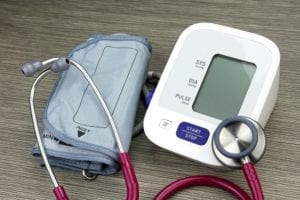Written by Angeline A. De Leon, Staff Writer. Moderate and excessive alcohol use was significantly associated with hypertension in men, while in women, only excessive drinking was significantly associated with hypertension.
 Elevated blood pressure, also known as hypertension, is a condition in which the force of blood against the artery walls is too high. The American Heart Association has called high blood pressure a “silent killer,” as it is largely symptomless. However, evidence is clear that hypertension is a major risk factor for cardiovascular disease (CVD). Currently, the relationship between regular alcohol consumption and blood pressure is under study, with some studies showing a linear association at lower quantities of intake 1 and others suggesting a positive relationship only at higher levels 2. The effects of alcohol also appear to differ based on sex, with the blood pressure of males showing greater sensitivity to alcohol consumption, as compared to women. 3. Evidence is clear, however, that alcohol intake outside of meals increases the odds of hypertension 4, and consumption of beverages with lower alcohol concentrations has been found to effectively reduce BP levels 5. In a 2018 study 6, researchers conducted an investigation to estimate rates of alcohol consumption in Brazil, a country in which both habitual alcohol consumption and the prevalence of hypertension has increased in recent decades 7, and to determine the relationship between alcohol intake and blood pressure.
Elevated blood pressure, also known as hypertension, is a condition in which the force of blood against the artery walls is too high. The American Heart Association has called high blood pressure a “silent killer,” as it is largely symptomless. However, evidence is clear that hypertension is a major risk factor for cardiovascular disease (CVD). Currently, the relationship between regular alcohol consumption and blood pressure is under study, with some studies showing a linear association at lower quantities of intake 1 and others suggesting a positive relationship only at higher levels 2. The effects of alcohol also appear to differ based on sex, with the blood pressure of males showing greater sensitivity to alcohol consumption, as compared to women. 3. Evidence is clear, however, that alcohol intake outside of meals increases the odds of hypertension 4, and consumption of beverages with lower alcohol concentrations has been found to effectively reduce BP levels 5. In a 2018 study 6, researchers conducted an investigation to estimate rates of alcohol consumption in Brazil, a country in which both habitual alcohol consumption and the prevalence of hypertension has increased in recent decades 7, and to determine the relationship between alcohol intake and blood pressure.
A multi-centered, cross-sectional study was conducted using a baseline population of 7,655 men and women (aged 34-74 years). Alcohol consumption was assessed using the Alcohol Use Questionnaire (AUQ) to determine drinking pattern and weekly frequency of alcohol intake. Total amount of pure ethanol (g/week) was also estimated and frequency of alcohol consumption at meal time was evaluated. Blood pressure was measured at baseline and hypertension defined as a systolic reading of ≥ 140 mm Hg and/or a diastolic reading of ≥ 90 mm Hg.
When alcohol consumption was categorized by weekly ethanol intake (≥1 to <140, ≥140 to <210, ≥210 to <280, ≥280 to <420, ≥ 420) and all confounding variables adjusted for, statistical models indicated a dose-response association for alcohol consumption in relation to both systolic blood pressure (Odds Ratio = 1.41, 1.93, 2.11, 2.95, and 3.75, respectively) and diastolic blood pressure (OR = 1.49, 1.87, 2.07, 3.08, and 3.96, respectively). Compared to abstainers, moderate (≥ 1 to <210 g/alcohol per week) and excessive (>210 g/alcohol per week) consumption in men was associated with higher risk of hypertension (OR = 1.69, 2.79, respectively), while in women, only excessive drinking (≥ >140 g/alcohol per week) was significantly associated with hypertension (OR = 2.86). When adjusting for alcohol intake during meal time, relative to moderate consumers, excessive drinking was associated with higher risk of elevated blood pressure in both men and women (OR = 1.52, 2.04, respectively).
Findings correlate with previous research studies suggesting a positive, linear relationship between alcohol intake and risk of hypertension in both sexes. Odds of elevated blood pressure were especially increased among those with excessive consumption, compared to abstainers. Although limited by the nature of its cross-sectional design, the current study contributes to the identification of alcohol intake as among the variety of modifiable behavioral factors that, if regulated, can help prevent risk of hypertension development in the general population.
Source: Santana NMT, Mill JG, Velasquez-Melendez G, et al. Consumption of alcohol and blood pressure: results of the ELSA-Brasil study. PLoS ONE. 2018; 13(1): e0190239. DOI:10.1371/journal.pone.0190239.
© 2018 Santana et al. This is an open access article distributed under the terms of the Creative Commons Attribution License, which permits unrestricted use, distribution, and reproduction in any medium, provided the original author and source are credited.
Click here to read the full text study.
Posted May 7, 2018.
References:
- Fuchs FD, Chambless LE, Whelton PK, Nieto FJ, Heiss G. Alcohol consumption and the incidence of hypertension: The Atherosclerosis Risk in Communities Study. Hypertension. 2001;37(5):1242-1250.
- Marmot MG, Elliott P, Shipley MJ, et al. Alcohol and blood pressure: the INTERSALT study. Bmj. 1994;308(6939):1263-1267.
- Wakabayashi I. Influence of gender on the association of alcohol drinking with blood pressure. American journal of hypertension. 2008;21(12):1310-1317.
- Stranges S, Wu T, Dorn JM, et al. Relationship of alcohol drinking pattern to risk of hypertension: a population-based study. Hypertension. 2004;44(6):813-819.
- Rakic V, Puddey IB, Burke V, Dimmitt SB, Beilin LJ. Influence of pattern of alcohol intake on blood pressure in regular drinkers: a controlled trial. Journal of hypertension. 1998;16(2):165-174.
- Santana NMT, Mill JG, Velasquez-Melendez G, et al. Consumption of alcohol and blood pressure: Results of the ELSA-Brasil study. PloS one. 2018;13(1):e0190239.
- Coutinho ESF, França-Santos D, Magliano EdS, et al. ERICA: patterns of alcohol consumption in Brazilian adolescents. Revista de saude publica. 2016;50.

